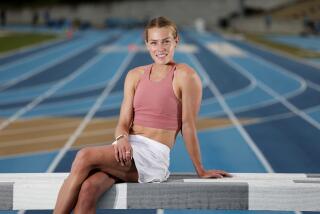VICIOUS CYCLE : Health Problems Leave Twigg Out of Olympics and Ready for Time Off
- Share via
Rebecca Twigg, her energy sapped by a season wracked with illness, could do little more than spin her wheels at the U.S. Olympic women’s cycling road racing trials earlier this month at Spokane, Wash.
Twigg, a 14-time national champion, couldn’t spin them fast enough to qualify for the Olympics next month at Seoul, South Korea. In fact, she was unable to finish among the top 60 in any of the three races that made up the U.S. trials.
It seemed a startlingly poor finish for Twigg, a four-time world pursuit champion who was the silver medalist in the inaugural Olympic women’s cycling race four years ago, when she finished less than half a wheel-length behind teammate and rival Connie Carpenter under a blazing sun at Mission Viejo.
But for Twigg, 25, her performance at the trials was not entirely unexpected.
“I had a feeling going in that I wasn’t as prepared as I wanted to be,” she said. “You always hope, because you know there have been days when you haven’t felt great, but you go out and do your best, and sometimes you even win.
“But I knew I was very far behind, and I’d been having problems lately with some kind of wheezing. I didn’t have high expectations, but I had some hope.”
It vanished quickly, however.
“It was a hilly course,” she said of the first day’s race. “That’s where fitness pays off, and it was obvious I lacked it.”
Twigg, who won two gold medals last summer in the Pan American Games at Indianapolis and was the U.S. Cycling Federation’s female athlete of the year, finished 63rd in a field of about 80 riders.
“There were a lot of components missing,” she said. “I was getting dropped on the hills, and I didn’t have the speed to stay with people on the flats. It was very frustrating.
“I finished high enough to qualify for the next race, but obviously it wasn’t as high as I’m used to finishing.”
It was, however, her highest finish of the week. In subsequent races, she was 67th and 65th, languishing at the back of the pack.
Her manager, George Taylor, said that Twigg, having missed so much training time because of illness, made uncharacteristic technical errors.
“When I saw that, I knew it was over,” he said of Twigg, who says she is almost certain to take some time off from cycling.
In February, Twigg raced in rain and cold at Paris for nine days and came down with a fever that eventually developed into strep throat because she didn’t care for it properly, she said. She wasn’t able to resume full-time training until May.
Then, at a race outside her hometown of Seattle near the end of the month, Twigg was caught in the rain again. She developed bronchitis.
A month later, at the Ore-Ida Women’s Challenge in Idaho, she had to pull out because of stomach cramps. A doctor told her she probably drank some sour milk.
“When I ended up getting sick and it was less than a month before the trials, I thought, ‘Maybe I’m not going to be able to pull this one off,’ ” Twigg said. “I lost a lot of confidence in that race.”
Time finally ran out for her at the trials.
“I’ve had some very bad luck, but I think there are some good things that can come out of it,” she said. “Maybe it’s an omen that I should go back to school.”
Twigg skipped high school, moving straight from the eighth grade to the University of Washington before her 15th birthday. She earned a degree in biology a year after the 1984 Olympics.
The last four years have been difficult for Twigg. She was named in the blood-doping scandal that clouded the U.S. cyclists’ strong performance in the 1984 Games, and her two-year marriage to cyclist Mark Whitehead was dissolved last winter.
“It’s been rough,” she said.
Living for two years in South Pasadena contributed to her health problems, she said, because of the poor air quality in that area. She moved last winter to La Mesa in San Diego County.
“I was diagnosed as having exercise-induced asthma when I was 15, but as I got older and fitter, I didn’t notice it,” she said. “But I had some problems with wheezing when I raced in the cold in ‘86, and it came back again in ’87.”
Twigg also had a poor start in 1987. She crashed during a training ride in March and suffered a cut on the top of her head that required 16 stitches to close.
But a few months later, at the Ore-Ida Challenge, she turned her season around, surprising herself by winning one of the event’s 10 stages.
Her health problems, she said, have all but convinced her that she should discontinue cycling for a while, maybe for as long as two years. She plans to pursue a master’s degree in physical therapy.
Twigg will attend the Olympic track cycling trials this week in Houston but will not compete.
She also will not compete later this month in the World Championships at Ghent, Belgium, although she is qualified to do so as the defending champion in her specialty, the individual pursuit, which is not part of the Olympic program.
“There’s just no point in the federation spending all that money for me to ride as poorly as I have been,” she said.
More to Read
Go beyond the scoreboard
Get the latest on L.A.'s teams in the daily Sports Report newsletter.
You may occasionally receive promotional content from the Los Angeles Times.






